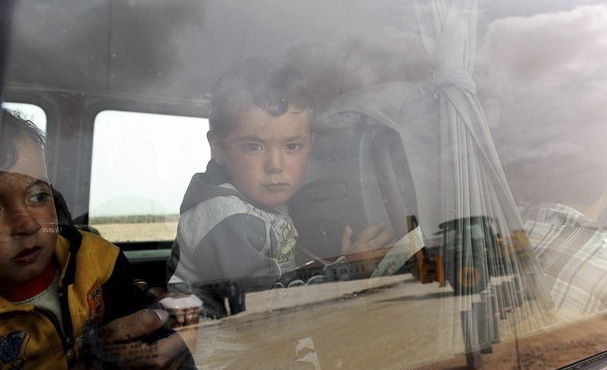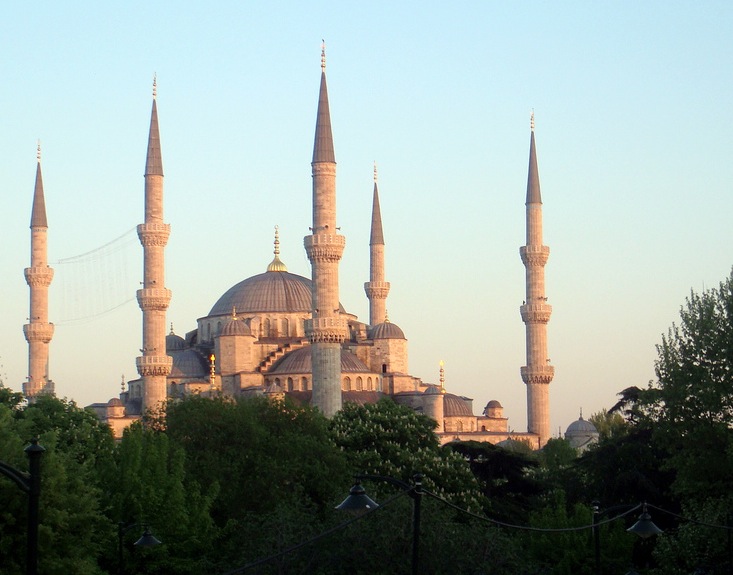
Yasser Jani huddled in a tiny slither of shade. He wanted an escape from the heat and crowding and an uncertain future.
But the small patch of trees just outside the camp for Syrian refugees here didn't offer one and his face showed it.
"Most of the people here are hopeless," said the short, middle-aged Syrian who taught high school science until fleeing last year with his wife, two small children, mother and brother. "They lost their homes, their work, and their money and they don't know anything about their future," he said. "And I feel the same way," he added flatly.
Amid all of their pressing woes, the refugees have settled into disparate worlds of faith and despair, of denial and acceptance of their fate and many places in between.
Yasser Jani is one of those refugees living in between.
As Syria boils, more than 110,000 Syrians have settled in refugee camps in the region, thousands more are squatting on their own in Turkey and nearby countries, and many more appear on their way out of Syria.
Despite Jani's frustration about spending the last year in the small, crowded camp, where he says the daily inconveniences are many, he has made sure there are classes for young children. It's all he can do, he added.
Likewise, Ahmed Hassoun, 56, follows the same daily routine in Antakya, a large city in southeastern Turkey where many refugees have gathered, because it gives his exile meaning.
A lawyer from Idlib in northwestern Syria, he puts on a clean shirt and well-pressed pants early in the morning in an almost empty apartment, where he lives with his children, and heads to an office where he works with 20 other Syrian refugee lawyers. His wife stayed behind in Syria.
He gets no pay for his work but that doesn't matter. None of the lawyers do. But they have gathered daily, meeting with clients and taking careful notes for the last month. Their goal is to produce an accurate and detailed account of the abuses suffered by Syrians under the Assad regime. They hope to turn it over to the International Criminal Court or to a court in Syria when they return, he explained.
They are also working with attorneys within Syria to compile their records.
From the handful of refugees who visit the office daily to tell their stories or the stories of others who are too ashamed (as is the case for female rape victims) or too overwhelmed to recount the events, they have catalogued more than 30 kinds of torture, and at least 1,500 rapes, some of them in groups.
His records show that the Syrian torturers use metal rods and wooden sticks and often electricity on their victims. They also use acid and it is not unusual for victims to die of their burns and wounds, he said.
Soldiers caught escaping "are executed right away by gun or they slaughter them with knifes," he said.
As a fellow attorney sitting beside Hassoun told of seeing someone beaten to death on the street with a rock, Hassoun added quietly, "I feel terrible when I hear these stories."
Dr. Mohammed Sheik Ibrahim, 38, is a soft-spoken pediatrician, who didn't want to leave Syria even after eight months in prison, where he suffered many of the tortures that Hassoun has been cataloguing.
"They put me in a small cell for 28 days and they interrogated me four times a day for an hour or two each time. Or they would make me stand for hours. They beat me. They used wooden sticks and metal sticks, he said. "I heard them raping women and girls in the rooms nearby."
When he came home to Latakia from prison, he continued to speak out to his clients, his colleagues and anyone else about the regime's abuses. "I wasn't afraid," he explained. Then one day a high-ranking official warned him that his life was in danger. He fled the next day – nearly nine months ago.
He has since been working with injured fighters in Turkey from the Free Syrian Army. When thousands of fellow Turkmens from Syria poured across the border recently, driven by aerial attacks, he rushed to the camp that Turkish officials quickly set up for them in Yayladag.
He is committed, he said, to work with the fighters and follow them into Syria when they launch a large offensive. His father has asked him not to go, but he remains determined to go with the fighters, he says.
His explanation: he is a doctor treating one wound after another with no end in sight. "When I am fixing them (the soldiers), I tell myself that Bashar Assad is the man with the knife and he is the one causing all of these wounds."
For Dr. Khaula Sawah, who knows much about the refugees' medical needs, her mission has been to organize the help coming from expatriate Syrians medical professionals like herself. The expats arrive here in waves from across Europe, the U.S. and the Arab world. Another goal is to find the medical supplies needed inside of Syria.
A clinical pharmacist at a Cincinnati hospital, she has already come to southeastern Turkey five times this year for this kind of work. She was born in St. Louis, but moved as a child to Syria with her Syrian-born parents. When her father was put in prison by the government, the family waited 12 years in Syria until he was released.
She is the vice-president of the Turkish branch of the Union of Syrian Medical Relief Organizations and one of her jobs lately has been filling up a small warehouse with medicine and then finding safe ways to smuggle it into Syria.
"The needs are humungous," she said. "We'll pitch in $100,000 worth of medicine and it is gone in a few days."
At the warehouse – the basement of a nearby apartment house in Reyhanli – people were unpacking a new delivery of blood absorbing bandages. A US manufacturer had donated the supplies, worth nearly $500,000, she said.
From her visits to the Turkish-run camps as well as clinics that the Syrian physicians have set up, she has witnessed the refugees' frustration.
And it's been especially difficult, she said, for those who didn't want to live in the camps because of their stark conditions or isolation. As a result, they struck out on their own, renting apartments and often doubling up with other families. In many places, rents doubled with the refugees' arrival, the refugees say.
"They are all illegal and they don't have any rights," she explained. Soon they run out of money and then discover that they can't get help at the Turkish hospitals because they are not registered. "I just got a call from a woman who went to the state hospital and said they wouldn't check in her child."
But the greatest discontent, she said, is felt by those longest in the camps. It wells up into squabbles between groups and complaints about conditions. Indeed, there have been three disturbances in refugee camps in recent weeks and Turkish security forces used tear gas and fired bullets into the air to quell an uprising at a camp.
But Dr. Sawah has also seen the way the refugees have struggled to accommodate each other and to adjust to a future on hold.
Some have set up small stores in the camps to earn money and make life more hospitable. And at overcrowded clinics, patients have given up their beds and slept on the floor to make room for new arrivals.
At the Yayladag camp, where a recent fire took the lives of a newlywed couple who had arrived only a few days earlier, Yasser Jani worries about the young children who he says need food and clothing, and the teenagers who need a school. He worries too about the women who have to put up with a lack of privacy and many inconveniences.
After the fire at the camp, an old factory warehouse not far from the Syrian border, Turkish officials talked of moving the refugees to another camp. But overcome by the arrival of as many as 1,000 refugees a day, the camp has stayed open.
Privately Jani worries about not having money and what's ahead. But on another day with temperatures in the low 100s, he worries about just catching his breath. Most nights he cannot sleep because of the heat, he said.
"But I'm trying to make my life better."


